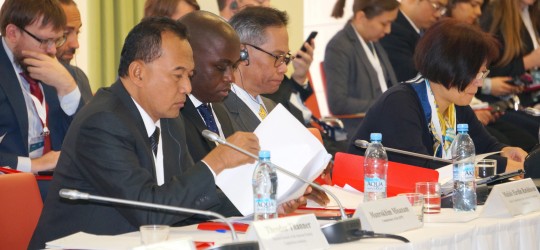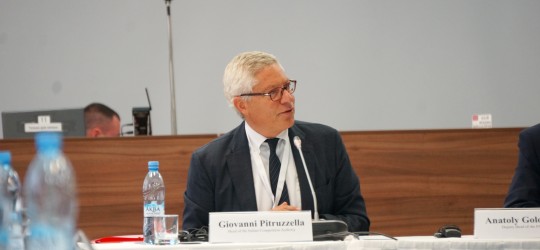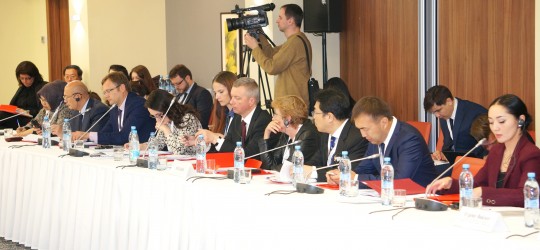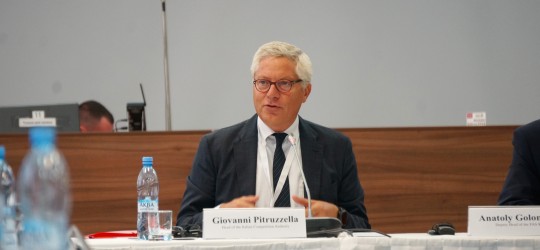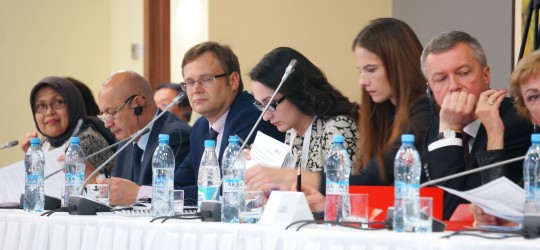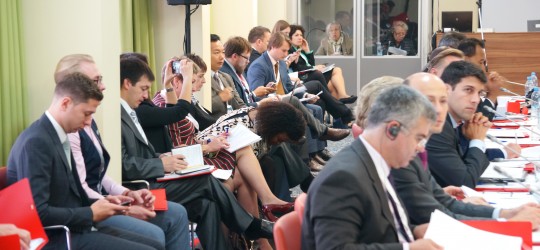Сomparative analysis of medicinal drug prices will give an additional argument in negotiations with pharmaceutical manufacturers
On 27 September 2016, at a Joint Session of the BRICS Coordination Committee on Antimonopoly Policy, the International Working Group for Research on the Competition Issues in the Pharmaceutical Sector and the Headquarters «Protection and advocacy of competition in the pharmaceutical market», the Head of FAS Department for Control over Social Sphere and Trade, Timophey Nizhegorodtsev discussed the results of the first stage of an international comparison analysis of prices for medicinal drugs, carried out by FAS.
Timophey Nizhegorodtsev pointed out that under the frame of executing the instructions given by the President of the Russian Federation, FAS undertakes considerable efforts to analyze world prices for medicinal drugs, the purpose of which is to search for possibilities to reduce prices for expensive drugs and enhance efficiency of budgetary spending on drug supply.
At the first stage, FAS analyzed prices for drugs purchased under the “7 Nosologies” programme (1). The survey compared manufacturer prices (without VAT) in the relevant countries and public procurement prices. For Russian data FAS used the maximum ex-works prices without VAT and the actual delivery prices for the public needs based on the results of federal auctions in 2015-2016 (also without VAT).
According to the FAS representative, the antimonopoly authority studied data from 43 countries, particularly 22 EU members, 5 CIS countries and 3 BRICS countries, collected information from national healthcare and economic regulators of different countreis, associations of pharmaceutical manufacturers, distributors and pharmacy chains, open sources and field studies in pharmacies.
Timophey Nizhegorodtsev emphasized that the analysts did not manage to compare all submitted price data so “conclusions should be made very carefully”.
“The main issues are absence of open information on most part of drugs, other drug analogues in circulation in various countries, other methods of treating diseases, for which the drugs in question are used in Russia, and lack of interest from the largest international pharmaceutical manufacturers to supply expensive drugs to particular countries”, said FAS representatives.
In spite of all difficulties FAS managed to conduct economic analysis, the findings of which have led the Antimonopoly Service to a number of conclusions:
- No drugs from the “7 Nosologies” programme were identified, for which prices in Russia were the highest among the analyzed countries
- Drug prices in Russia were the lowest on 21 positions (2).
“It is explained by the fact that prices in Russia are registered in Rubles, and preliminary control is exercised in the course of registering import prices, which prevents registering ceiling prices higher that the lowest prices for such drugs in 21 countries”, explained Timophey Nizhegorodtsev.
FAS also found 48 drug positions, on which the ceiling prices registered in Russia were considerably higher than the identified lowest prices in some countries of the world. According to FAS representatives, it can be related to objective reasons (other conditions at the time of price registration) as well as incomplete or invalid data provided in the course of price registration on prices in the reference countries.
In the final part of the report, Timophey Nizhegorodtsev pointed out that on all exposed cases of the ceiling ex-works prices registered in Russia exceeding the lowest prices in the reference countries, FAS inspects whether such information is reliable.
“Should our concerns be confirmed, FAS will initiate a procedure for abolishing decisions on state registration of ceiling ex-work prices. At the same time, to prevent drug shortage FAS proposes that by 20th October 2016 the manufacturers of the relevant drugs can take advantage of the right to file applications on voluntary reduction of the registered ex-works ceiling prices. Reconsidering the registered ex-works ceiling prices can result in considerable saving of budgetary funds, which in its turn can be aimed at additional drug supply to the population”, concluded Timophey Nizhegorodtsev.
He also pointed out that based on the findings, FAS intends to ask to review the list of the reference countries, replacing the countries with the highest prices for the countries with the lowest prices.
“FAS continues analyzing the world prices for other drugs purchased with the funds from the federal budget”, stated Timophey Nizhegorodtsev.
At the second and the third stage the Antimonopoly Service plans to analyze prices for the drugs purchased by the Ministry of Health Care under the “HIV and Hepatitis” programme (3) and the “Tuberculosis and Vaccines” programme (4).
Reference:
- 1. The list of drugs under the “7 Nosologies” programme comprises 24 International Non-Proprietary Names, under the frame of which 292 drugs from various manufacturers in particular packaging are registered in the Russian Federation (in view of different preparations, dosages and packaging). Of them the Ministry of Health Care purchased 78 drugs in 2016 based on the auction results.
- 2. Detailed information can be found in the report given by Head of FAS Department for Control over Social Sphere and Trade, Timophey Nizhegorodtsev.
- 3. The list of drugs under the “HIV and Hepatitis” programme includes 43 International Non-Proprietary Names, under the frame of which 852 drugs from various manufacturers in particular packaging are registered in the Russian Federation (in view of different preparations, dosages and packaging). Of them the Ministry of Health Care purchased 107 drugs in 2016 based on the auction results.
- The list of drugs under the “Tuberculosis and Vaccines” programme has 19 International Non-Proprietary Names, under the frame of which 80 drugs from various manufacturers in particular packaging are registered in the Russian Federation (in view of different preparations, dosages and packaging). Of them the Ministry of Health Care purchased 18 drugs in 2016 based on the auction results.














